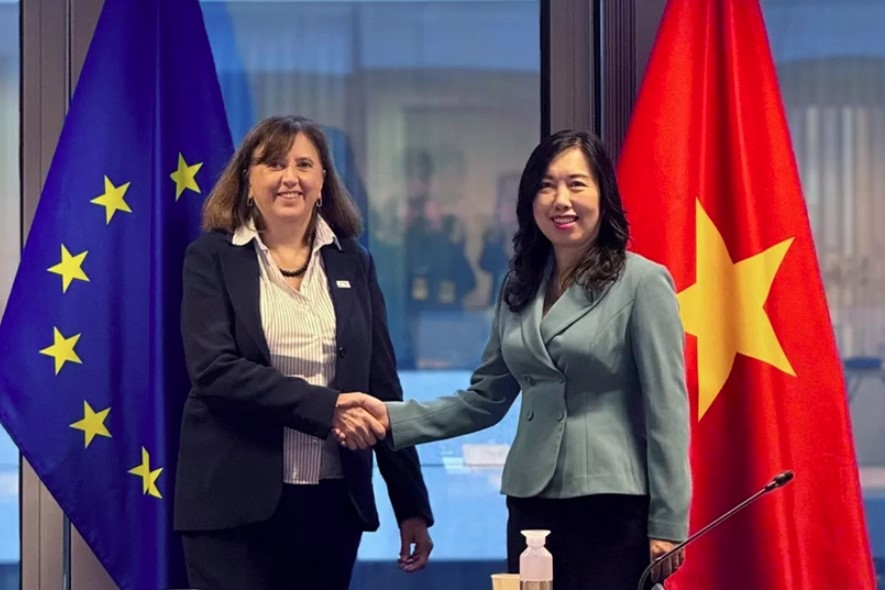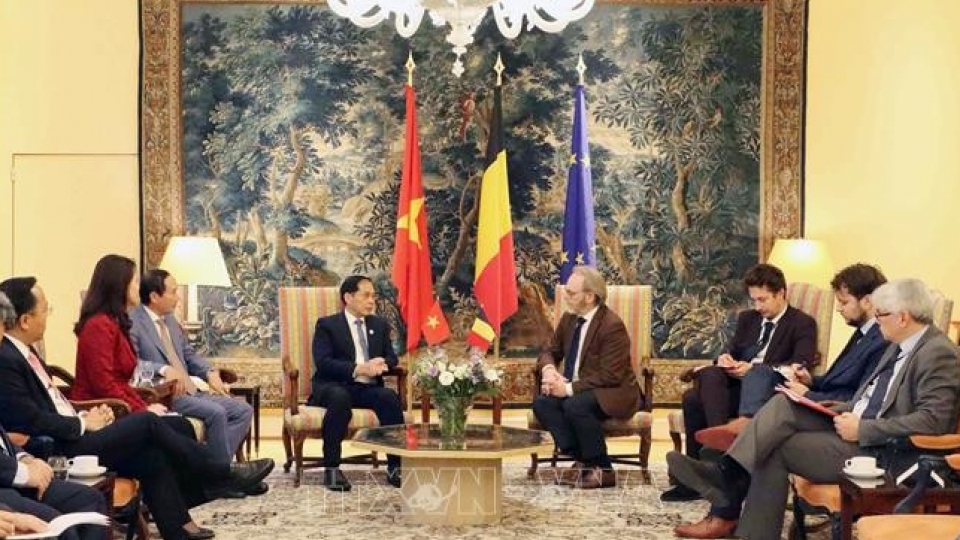Vietnam, EU hold sixth Joint Committee’s session to advance partnership
Deputy Minister of Foreign Affairs Le Thi Thu Hang and Acting Managing Director for Asia and the Pacific of the European External Action Service (EEAS) Paola Pampaloni has co-chaired the 6th session of the Vietnam - EU Joint Committee in Brussels to realise the Vietnam-EU Partnership and Cooperation Agreement (PCA).

Pampaloni opened the session by extending condolences to Vietnam over recent storm and flood damage. The EU has provided 850,000 EUR in humanitarian aid and is pressing member states for additional contributions. Luxembourg, Germany and the Czech Republic have already responded, with Luxembourg’s first relief shipment landing in Vietnam, she said.
Both sides shared updates on socio-economic conditions and foreign policy, while reviewing bilateral cooperation under existing frameworks, including the Defence-Security Dialogue, the Trade Committee tasked with implementing the EU-Vietnam Free Trade Agreement (EVFTA), and specialised subcommittees.
They agreed that Vietnam–EU relations have been growing after 35 years of diplomatic ties, citing increased political trust and regular exchanges of delegations at all levels, especially those at high level. Vietnam has established Comprehensive Strategic Partnership with France; Strategic Partnerships with Spain, Germany, Italy, the Czech Republic, Finland and Bulgaria; and Comprehensive Partnerships with Denmark, Hungary and the Netherlands. This is seen as a solid basis for further upgrading Vietnam - EU relations.
Cooperation in trade-investment, development, national defence-security, education-training, and climate response has gained traction. EU-backed programmes on public finance modernisation, economic governance and energy transition have proved effective.
The two sides vowed to step up high-level exchanges, ensure the EVFTA's effective implementation, and encourage the remaining six EU member states to soon ratify the EU–Vietnam Investment Protection Agreement (EVIPA). They also committed to fully utilising existing cooperation and dialogue mechanisms.
Looking ahead, Vietnam and the EU promised to broaden collaboration in potential fields, particularly trade and investment, green economy, digital transformation, circular economy, sustainable fisheries, clean energy transition, sci-tech, innovation, infrastructure and climate adaptation, with sci-tech and innovation flagged as a new pillar.
Hang called on the EU to help Vietnam fully tap initiatives such as Erasmus+ (Education, Training, Youth, and Sports Programme), Horizon Europe (EU's largest research and innovation programme) and the Just Energy Transition Partnership (JETP). She also outlined Vietnam’s intensified efforts to combat illegal, unreported and unregulated (IUU) fishing and urged the EU and its member states to soon lift the “yellow card” warning. The EU acknowledged Vietnam’s progress and agreed to continue technical discussions.
Participants put forward specific proposals to boost cooperation in trade-investment, finance, agriculture, development, climate response and national defence-security.
The EU reaffirmed Vietnam’s status as a key partner in the Asia-Pacific, praising its socio-economic performance and global integration, and expressed hope that Vietnam would engage actively in the EU’s Indo-Pacific Strategy and Global Gateway Initiative.
Both sides reiterated backing for multilateralism and the role of the United Nations, stressing that maritime disputes must be settled peacefully in accordance with international law, particularly the 1982 UN Convention on the Law of the Sea (UNCLOS), while ensuring security, safety and freedom of navigation and overflight in the East Sea.
Vietnam and the EU also underlined the need to bolster the ASEAN-EU Strategic Partnership, expand trade-investment, tackle global challenges such as climate change, natural disasters, environmental degradation and pandemics, contributing to green and sustainable development in sub-regions, including the Greater Mekong Sub-region.
The meeting concluded with a joint commitment to deepen comprehensive cooperation, fully leverage existing dialogue mechanisms and expand collaboration in promising areas, setting the stage for a more substantive and sustainable bilateral partnership in the years ahead.




